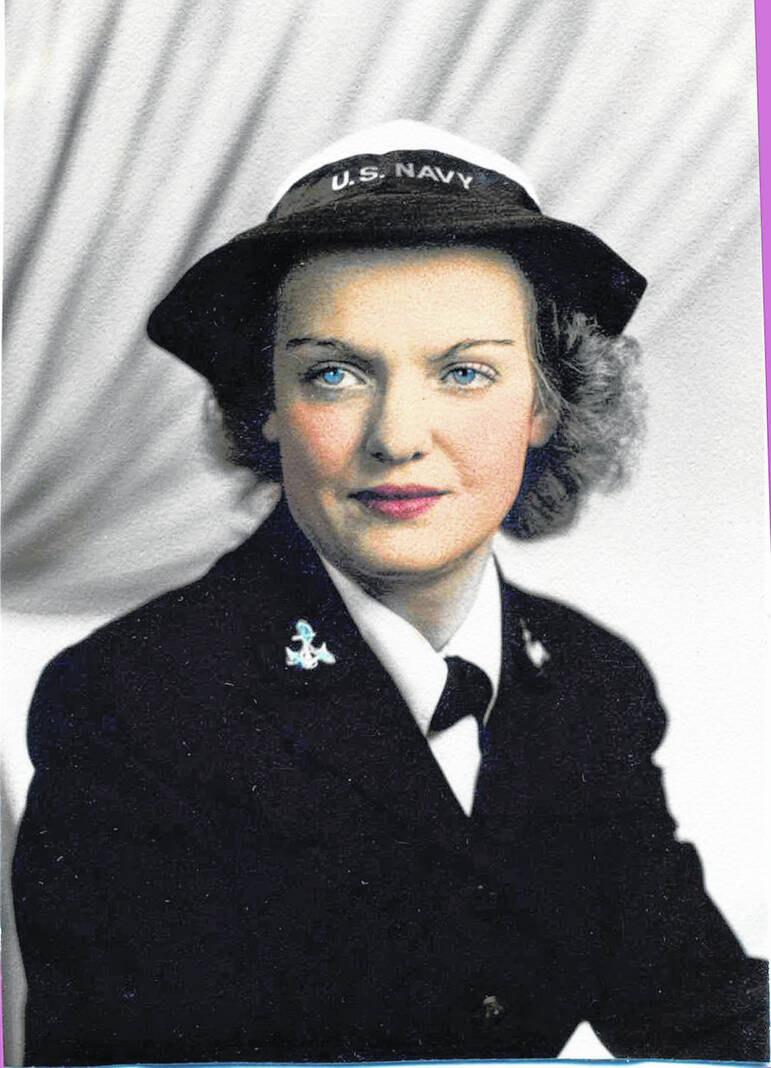
Dorothy Hershey

By Vivian Blevins
Contributing Columnist
In the past year, part of my focus has been on telling the stories of women in the Miami Valley of Ohio who have served in the military. Thus far, I have written brief biographies of 30 plus, and their stories and photographs will soon be digitized and stored at the Piqua Public Library, thanks to the courtesy of John Piatt from the local history/genealogy department. Their stories inspire me as they have ranged from serving as a nurse near the front lines to planning war games to being responsible for fire power aboard a U.S. Coast Guard vessel (And fire power does not mean putting out fire aboard ships as I initially thought).
Dorothy Helen Hershey (1915-2004) was born in Piqua, Ohio, and her daughter Mary Wright, former teacher and currently administrative assistant at the Covington Fire and Rescue Department, recalls bits and pieces of her mother’s life as she prepares for a three-generation estate sale at the log house in Covington where her mother’s U.S. Navy dress uniform with white gloves and the white purse navy women from the era carried and her logbook are carefully preserved.
Wright doesn’t know why her mother joined the Navy because with her two-year degree from Miami University, which she earned in 1935 after graduating from Covington High School in 1933, she was teaching fifth grade in Covington. She suggests that perhaps it was the mood of the country following the bombing of Pearl Harbor in 1941 when so many Americans were actively engaged in a host of activities from raising victory gardens to rolling bandages to saving scrap metal to assist in the war effort and defeat the monsters who were threatening democracy.
Hershey left teaching in 1943 and following basic training was deployed to the Naval Air Station at Corpus Christi, Texas. The station provided flight training for navy pilots and was the place where 41st U.S. President George H. W. Bush earned his wings in 1943. Hershey’s job was to monitor and record the performance of pilots in training on the Link Flight Trainer, a simulator invented by Edwin Link which was designed to shorten training time and improve safety so that those learning to fly could learn instrument flying in safe conditions before actually taking to the air. As Wright and her father were going through
her mother’s belongings following her death, Wright asked her distraught father if she could have her mother’s navy logbook. Her dad’s response was, “Yes, but take good care of it.” The logbook has the names of men who came through Hershey’s section with notations of their progress in areas such as landing, normal cruising, climbing and gliding. This logbook is a very personal look into her mother’s work in the military and lists men from around the county who were learning to do their part as U.S. Navy pilots, some following in the footsteps of those in their family who had served before.
During off times, Hershey and other women were assigned to search for possible enemy activity in the Gulf Coast. Her daughter reports that Hershey and the women with her would spot something and then eventually cry out, “No, not a plane. The wings are flapping, It’s a bird.”
At that deployment, there was the usual flirting, but one of the officers, never named by Hershey, was hostile toward women in the military and assigned them to situations where they would be hot in the Texas sun and in planes “with a clear front window” that with the heat and humidity made them physically ill. Her daughter says of her mother, “She worked in a man’s world, but she felt that she had a job to do and was determined to do it well.”
Hershey left the navy in November of 1945 and the man she was to marry in December of that same year, Ned Watson, recipient of a Purple Heart after taking a bullet in his left arm, had left the U.S. Army a month earlier after having served in North Africa and the European Theater in intelligence and reconnaissance with the 41st Infantry. Hershey, now Watson, earned her B.A. at The Ohio State University after her military service and taught elementary school at Covington until she retired in 1967.
When Wright was in high school the Vietnam War was raging and Wright said she told her parents, “You have the army and the Navy covered; maybe I should join the Air Force.”
Their response was, “Absolutely not.”
“Why not?”
Her mother said, “This war is not like it was back then. This discussion is over.”
Wright says that when her mother said a discussion was finished, it was finished. She knows that her mother wasn’t against the war but was against the danger.
Later, Wright asked, “Why are we fighting in Vietnam?” And the answer was “To keep Communism away.”
With a chuckle, Wright says in answer to my question about the influence her mother’s military experience had on her as she grew up was, “I can make an outstanding bed, tight and perfect. Ready for inspection.”
PS: There is a real danger in not recording experiences in the military as over time, they will be lost. Official service records are available in the archives in St. Louis to the next of kin; however, the personal stories can only be revealed by those who served. If there is sufficient interest, I will have monthly meetings beginning in January at the Miami Valley Veterans Museum in Troy to help veterans record their stories. Participants need not worry about writing skills as nothing will be graded. Start gathering old photographs and making notes. Email me with your contact information if you’re interested, [email protected], and I’ll email you the particulars.




